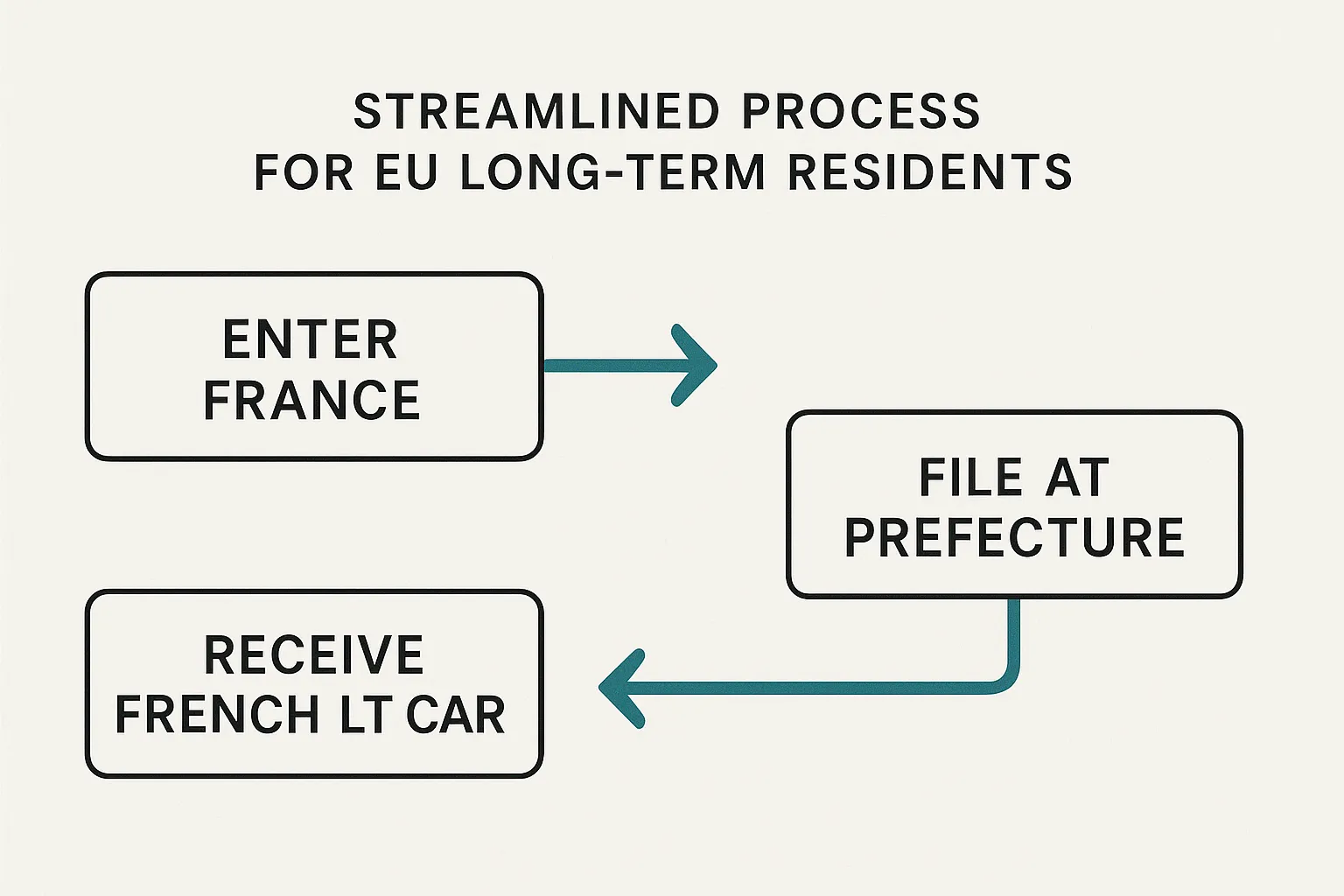Long-Term EU Residence Card Holders: Moving to France Simplified

Moving from one EU country to another should feel seamless when you already hold a Long-Term EU Residence Card (LTR, sometimes called the « permanent residence permit EU »). In practice, every member state applies its own rules, and France is no exception. If you want to turn your German, Italian or Spanish LTR into a valid French residence status—and eventually a 10-year carte de résident—this guide walks you through the 2025 requirements, deadlines and paperwork.
1. Understanding Your Starting Point
The Long-Term EU Residence Card is issued under Directive 2003/109/EC and recognises that you have lived legally in another EU state for at least five years. It gives you a stronger legal footing than a regular national permit, but it is not automatically valid in France. Instead, it allows you to request a specific French card after entry.
Key advantages you already have:
- No labour-market test for most work permits
- Faster family-reunification track
- Access to some social benefits sooner than new arrivals
- Protection against expulsion similar to French long-term residents
France transposed the directive into Article L.426-17 of the CESEDA. That article sets the pathway we cover below.
2. Who Can Use the Simplified Track?
You may request a residence card in France if you:
- Hold a valid LTR issued by another EU or Schengen state.
- Have lived in that issuing state for at least five continuous years before obtaining the card.
- Plan to stay in France more than three months (short visits do not require any French permit).
- Have resources equal to the French SMIC net wage (€1 398 per month in 2025) or a signed work contract.
- Hold full health insurance covering French territory (foreign or French policy accepted).
Family members who already have derivative LTR cards can apply at the same time. If they hold national cards, they must follow ordinary family-reunification rules.
3. Before You Leave Your Current EU Country
France lets you enter visa-free with your LTR card and passport, but good preparation avoids headaches.
- Book housing for at least six months; hotel stays beyond one month rarely satisfy prefectures.
- Secure a work offer or proof of resources. A signed French CDI or a remote-work contract from abroad both work.
- Collect original civil documents (birth, marriage) with certified translations before departure; they are harder to obtain once in France.
- Download your LTR card history or confirmation letter from the issuing authority to prove continuous residence.

4. The First 90 Days in France: Your Compliance Timeline
| Day | Action | Proof you will need at prefecture |
|---|---|---|
| 0 | Enter France with passport + LTR card | Entry stamp or travel ticket (Eurostar, plane, bus) |
| 1–10 | Sign a lease or accommodation attestation | Utility bill, lease, or attestation d’hébergement + ID of host |
| 1–30 | Open a French bank account | RIB (bank details) |
| 1–60 | Register for French health coverage (CPAM) or buy private insurance | Attestation d’affiliation or policy certificate |
| 30–90 | Book a prefecture appointment online via ANEF « Changer de statut » | Screenshot or confirmation email |
| 90 | Deadline to file the application | Receipt (récépissé) issued by prefecture |
Missing the 90-day filing window means you must exit and apply for a long-stay visa from your original country of residence.
5. Building a Winning Prefecture File
The prefecture kit is lighter than a first-time visa dossier but precision matters. Below is the standard 2025 checklist; individual prefectures can add items, so always verify locally.
| Document | Notes |
|---|---|
| Passport (copies of ID and entry pages) | Must be valid for at least 12 months |
| Original Long-Term EU Residence Card + copy | Front and back |
| Proof of French address | Recent (<3 months) |
| Birth certificate (+ sworn translation if not in French) | Full form, parents listed |
| Marriage certificate or proof of partnership (if applicable) | Translation rules identical to birth certificate |
| Resources: employment contract or last 3 payslips or recent bank statements showing >€4 200 | Amount equals 3× SMIC net |
| Health insurance certificate covering French care | CPAM, private or European portable document S1 |
| Two ID photos (ISO/IEC 19794-5) | Digital photo code accepted |
| 50 € tax stamp (timbre fiscal) for the residence card | Buy online at timbres.impots.gouv.fr |
ImmiFrance clients receive prefecture-specific templates and live dossier reviews to eliminate missing-document refusals.
6. What Card Will You Receive?
- One-Year « Long-Term EU Resident – CESEDA L.426-17 » Card
- Issued to prove your new status while France verifies integration, language and resources.
- Renewal Path
- After one year, you may renew for four more years if you still meet conditions.
- Upon five years of legal and uninterrupted residence in France, you become eligible for the 10-year carte de résident or French naturalisation.
Fees and Timelines (2025 average)
| Stage | Prefecture processing | Fee |
|---|---|---|
| Initial filing (récépissé) | Same day | 0 € |
| Decision issuance | 2–4 months | 225 € (including stamp) |
| Card production | 7–10 working days | Included |
Delays spike during summer strikes; monitor our Prefecture Strike Calendar article to adjust travel plans.
7. Working in France Immediately: Is a Work Authorisation Needed?
Good news: holders of an LTR card may work in France as soon as they file their application, provided they submit an employment contract and obtain the stamped récépissé mentioning “autorise son titulaire à travailler.” No separate work authorisation (APT) is required.
If your récépissé omits the phrase, request a corrected version or carry your signed contract and payslips to avoid employer sanctions.
8. Common Pitfalls (and How to Avoid Them)
- Late appointment booking: some prefectures open slots only 45 days ahead. Use ANEF alerts or ImmiFrance’s monitoring tool.
- Insufficient resources: include partner income or a sworn support letter with bank statements when solo funds fall short.
- Missing translations: only sworn French translators (traducteurs assermentés) are accepted; machine or self-translations are refused.
- Expired LTR card: renew it in the issuing country before moving. France will not process an application on an expired card.

9. Converting Family Members’ Status
Spouse and minor children who hold derivative LTR cards follow the same simplified path. For relatives without LTR status:
- Spouse/partner: apply for a « vie privée et familiale – membre de famille d’un résident de longue durée UE » card. Proof of stable and sufficient resources is still required.
- Children over 18: must qualify independently (studies, work contract) or enter as visitors.
See our dedicated guide on the Carte de Séjour for EU Family Members for document details.
10. Pathway to French Citizenship
Time spent under the French LTR card counts fully toward the five-year residence requirement for naturalisation. Combined residence between your previous EU country and France does not qualify; only French residence does. Fast tracks (marriage to a French citizen, military service) remain available.
Frequently Asked Questions
Do I need a visa to enter France if I hold an EU Long-Term Residence Card? No. Present your valid LTR card and passport at the border. You have a 90-day visa-free window to file your French application.
Can I keep my original EU Long-Term status after receiving the French card? Yes, the original card remains valid in the issuing country. Losing French status does not automatically cancel it, but long absences may trigger revocation under local rules.
What happens if I lose my job before the French card is issued? You keep eligibility if you register with Pôle Emploi and maintain health insurance. Provide proof of unemployment benefits or savings at the renewal stage.
Does time spent under a récépissé count toward the five years needed for citizenship? Yes. All periods of legal stay, including validated récépissés, count under Article L.314-7 CESEDA.
Ready to Secure Your French Status?
ImmiFrance has helped hundreds of Long-Term EU residents make a smooth transition to France. Our services include:
- Prefecture slot monitoring and booking
- Dossier review by former immigration officers
- Sworn translation coordination at discounted rates
- Real-time case tracking via your personal dashboard
- Fast lawyer referral if complications arise
Book a free 15-minute eligibility call today at https://immifrance.com and turn your EU mobility rights into a successful new life in France.
